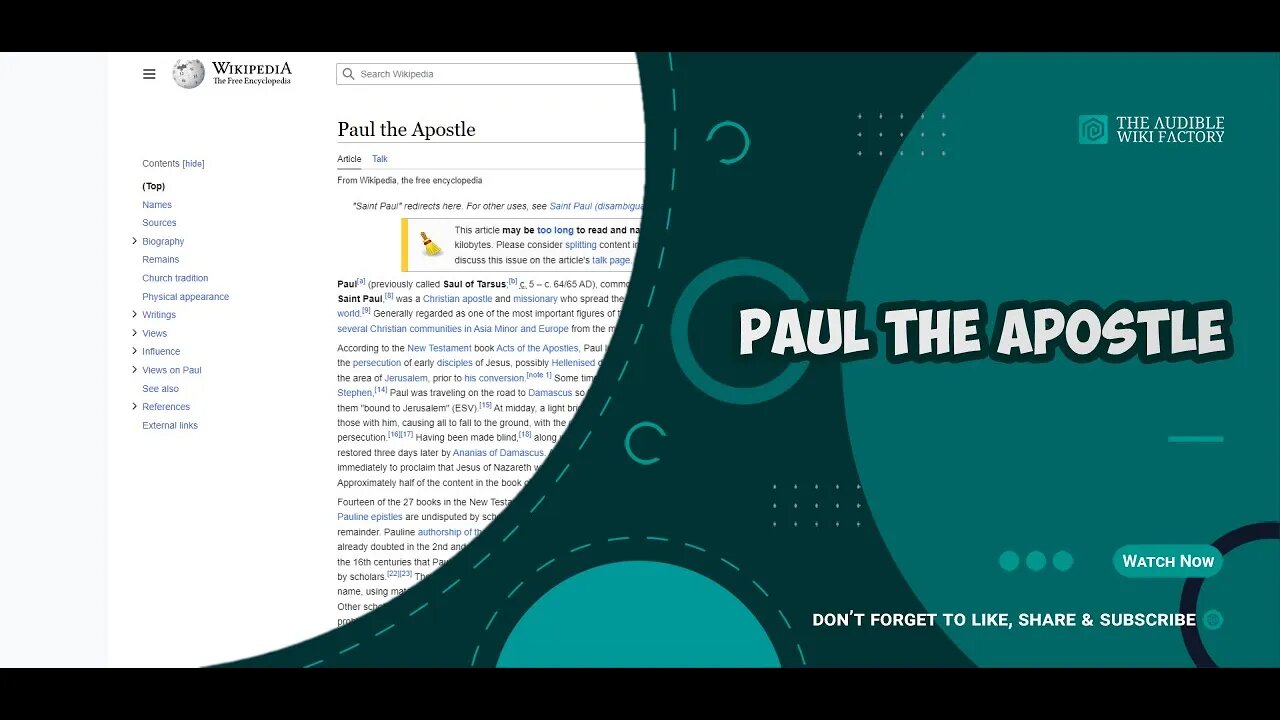Premium Only Content

Paul, commonly known as Paul the Apostle and Saint Paul, was a Christian apostle and missionary
Paul (previously called Saul of Tarsus), commonly known as Paul the Apostle and Saint Paul, was a Christian apostle and missionary who spread the teachings of Jesus in the first-century world. Generally regarded as one of the most important figures of the Apostolic Age, he founded several Christian communities in Asia Minor and Europe from the mid-40s to the mid-50s AD.
According to the New Testament book Acts of the Apostles, Paul lived as a Pharisee. He participated in the persecution of early disciples of Jesus, possibly Hellenised diaspora Jews converted to Christianity, in the area of Jerusalem, prior to his conversion. Some time after having approved of the execution of Stephen, Paul was traveling on the road to Damascus so that he might find any Christians there and bring them "bound to Jerusalem" (ESV). At midday, a light brighter than the sun shone around both him and those with him, causing all to fall to the ground, with the risen Christ verbally addressing Paul regarding his persecution. Having been made blind, along with being commanded to enter the city, his sight was restored three days later by Ananias of Damascus. After these events, Paul was baptized, beginning immediately to proclaim that Jesus of Nazareth was the Jewish messiah and the Son of God. Approximately half of the content in the book of Acts details the life and works of Paul.
Fourteen of the 27 books in the New Testament have traditionally been attributed to Paul. Seven of the Pauline epistles are undisputed by scholars as being authentic, with varying degrees of argument about the remainder. Pauline authorship of the Epistle to the Hebrews is not asserted in the Epistle itself and was already doubted in the 2nd and 3rd centuries. It was almost unquestioningly accepted from the 5th to the 16th centuries that Paul was the author of Hebrews, but that view is now almost universally rejected by scholars. The other six are believed by some scholars to have come from followers writing in his name, using material from Paul's surviving letters and letters written by him that no longer survive. Other scholars argue that the idea of a pseudonymous author for the disputed epistles raises many problems.
Today, Paul's epistles continue to be vital roots of the theology, worship and pastoral life in the Latin and Protestant traditions of the West, as well as the Eastern Catholic and Orthodox traditions of the East. Paul's influence on Christian thought and practice has been characterized as being as "profound as it is pervasive", among that of many other apostles and missionaries involved in the spread of the Christian faith.
NAMES
Paul's Jewish name was "Saul" (Hebrew: שָׁאוּל, Modern: Sha'ûl, Tiberian: Šā'ûl), perhaps after the biblical King Saul, the first king of Israel and like Paul a member of the Tribe of Benjamin; the Latin name Paul, meaning small, was not a result of his conversion as it is commonly believed but a second name for use in communicating with a Greco-Roman audience.
According to the Acts of the Apostles, he was a Roman citizen. As such, he bore the Latin name "Paul" – in Latin Paulus and in biblical Greek Παῦλος (Paulos). It was typical for the Jews of that time to have two names: one Hebrew, the other Latin or Greek.
Jesus called him "Saul, Saul" in "the Hebrew tongue" in the Acts of the Apostles, when he had the vision which led to his conversion on the road to Damascus. Later, in a vision to Ananias of Damascus, "the Lord" referred to him as "Saul, of Tarsus". When Ananias came to restore his sight, he called him "Brother Saul".
In Acts 13:9, Saul is called "Paul" for the first time on the island of Cyprus – much later than the time of his conversion. The author of Luke–Acts indicates that the names were interchangeable: "Saul,...
LINK TO ARTICLE: http://en.wikipedia.org/wiki/Paul_the_Apostle
TAGS: Paul the Apostle, Pharisees, Year of death uncertain, Year of birth uncertain, Shipwreck survivors, Saints from Roman Anatolia, People from Tarsus Mersin, People executed by the Roman Empire, National symbols of Malta, Early Jewish Christians, Converts to Christianity from Judaism, Christian saints from the New Testament, 1st-century writers, 1st-century Christian theologians, Paul the Apostle
#GeneralKnowledge #AudibleWikiFactory #Audible #Wikipedia #PaultheApostle
-
 41:13
41:13
The Audible Wiki Factory
1 year agoThe Oktoberfest is the world's largest Volksfest, featuring a beer festival and a travelling
422 -
 2:14:54
2:14:54
TheSaltyCracker
7 hours agoTrump Goes Gangster ReeEEeE Stream 01-26-25
122K272 -
 4:42:13
4:42:13
Due Dissidence
16 hours agoTrump Calls To "CLEAN OUT" Gaza, Swiss ARREST Pro-Palestine Journalist, MAGA's Hollywood Makeover?
59.4K78 -
 2:02:20
2:02:20
Nerdrotic
8 hours ago $18.01 earnedDECLASSIFIED: JFK, MLK UFO Immaculate Constellation Doc | Forbidden Frontier #089
81.3K16 -
 3:00:14
3:00:14
vivafrei
16 hours agoEp. 248: "Bitcoin Jesus" Begs Trump! Rekieta Gets Plea Deal! Pardons, Deportations, Bird Flu & MORE!
187K190 -
 3:44:06
3:44:06
Rising Rhino
15 hours ago $13.04 earnedWashington Commanders Vs Philadelphia Eagles: NFL NFC Championship LIVE Watch Party
87.9K4 -
 13:00
13:00
Exploring With Nug
9 hours ago $6.65 earnedHe Went To Get A Haircut And Vanished WIthout a Trace!
70.9K3 -
 18:53
18:53
DeVory Darkins
2 days ago $32.28 earnedTrump JUST ENDED Mayor Karen Bass During HEATED Meeting
96.5K220 -
 21:06
21:06
Russell Brand
13 hours agoIT'S COMING
153K494 -
 21:26
21:26
Stephen Gardner
1 day ago🔥What JUST leaked out of Congress must be STOPPED NOW!
143K285